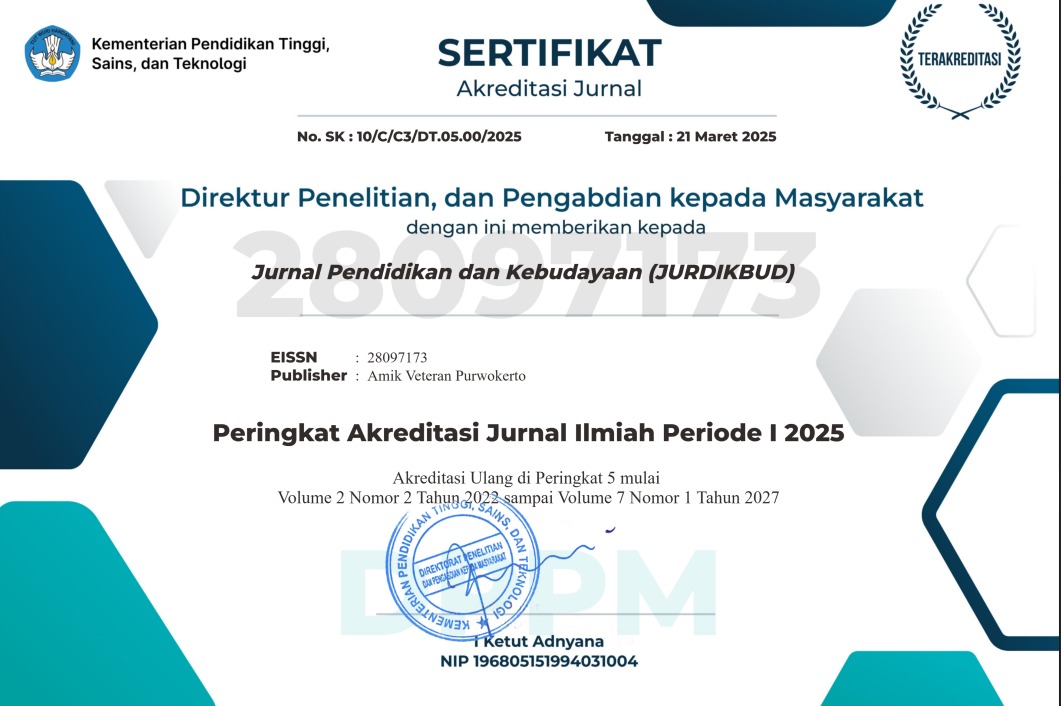Penerapan Pendekatan Saintifik Dalam Pembelajaran IPAS Materi Perubahan Dan Pelestarian Lingkungan Pada Siswa Kelas V SD
DOI:
https://doi.org/10.55606/jurdikbud.v4i3.7994Keywords:
Keywords: Scientific Approach, Science, Environmental Conservation, Active LearningAbstract
This study aims to describe the application of a scientific approach in science learning and analyze its influence on students' understanding and attitudes towards the material of environmental change and conservation. The scientific approach, which includes observing, asking, trying, reasoning, and communicating, is applied to increase students' active involvement and encourage deeper conceptual understanding. The research method used is descriptive qualitative with fifth-grade students in an elementary school in Makassar City as the subjects. Data collection techniques include observation, interviews, and documentation. The results of the study indicate that the application of a scientific approach can increase students' interest in learning, critical thinking skills, and concern for environmental issues. Thus, the scientific approach is proven effective in creating meaningful and contextual science learning.a.
References
Kemendikbud. (2014). Panduan pembelajaran menggunakan pendekatan saintifik. Jakarta: Kementerian Pendidikan dan Kebudayaan.
Kemendikbud. (2022). Capaian pembelajaran IPAS Sekolah Dasar dalam Kurikulum Merdeka. Jakarta: Kementerian Pendidikan, Kebudayaan, Riset, dan Teknologi.
Khoiri, A. (2020). Penguatan pembelajaran berbasis saintifik dalam kurikulum merdeka. Jurnal Pendidikan dan Kebudayaan, 25(3), 320–331. https://doi.org/10.24832/jpnk.v25i3.3567
Mutakinati, L., Anwari, I., & Kumano, Y. (2018). Analysis of students’ critical thinking skills in middle school science learning. International Journal of Instruction, 11(4), 813–824. https://doi.org/10.12973/iji.2018.11451a
Nugraha, A. R., & Suparno, S. (2021). Efektivitas pendekatan saintifik dalam pembelajaran IPAS berbasis proyek untuk meningkatkan keterampilan abad 21. Jurnal Ilmu Pendidikan, 27(1), 45–53.
Sartono, E. (2019). Pendidikan lingkungan hidup: Strategi pembelajaran berbasis karakter peduli lingkungan. Jurnal Pendidikan Lingkungan dan Pembangunan Berkelanjutan, 20(2), 56–67.
Suastra, I. W. (2015). Pendekatan saintifik dan keterampilan proses dalam pembelajaran IPA. Jurnal Pendidikan dan Pembelajaran IPA Indonesia, 5(1), 12–21.
Piaget, J. (1973). To understand is to invent: The future of education. Grossman Publishers.
Sani, R. A. (2014). Pembelajaran saintifik untuk implementasi Kurikulum 2013. Jakarta: Bumi Aksara.
Tilbury, D. (2018). Environmental education for sustainability: Defining the new focus of environmental education in the 1990s. Environmental Education Research, 1(2), 195–212. https://doi.org/10.1080/1350462950010206
UNESCO. (2017). Education for sustainable development goals: Learning objectives. Paris: United Nations Educational, Scientific and Cultural Organization.
Uno, H. B. (2016). Model pembelajaran: Menciptakan proses belajar mengajar yang kreatif dan efektif. Jakarta: Bumi Aksara.
Vygotsky, L. S. (1978). Mind in society: The development of higher psychological processes (M. Cole et al., Eds. & Trans.). Harvard University Press.
Widodo, S. (2021). Pendekatan saintifik dalam pembelajaran tematik SD berbasis Kurikulum 2013. Jurnal Pendidikan Dasar Nusantara, 7(1), 34–42.
Yulianti, D. (2018). Implementasi pendekatan saintifik dalam pembelajaran IPA untuk meningkatkan keterampilan proses sains siswa. Jurnal Ilmiah Pendidikan Fisika Al-Biruni, 7(1), 1–12. https://doi.org/10.24042/jipfalbiruni.v7i1.2127
Downloads
Published
How to Cite
Issue
Section
License
Copyright (c) 2024 Jurnal Pendidikan dan Kebudayaan (JURDIKBUD)

This work is licensed under a Creative Commons Attribution-ShareAlike 4.0 International License.









